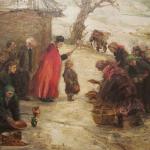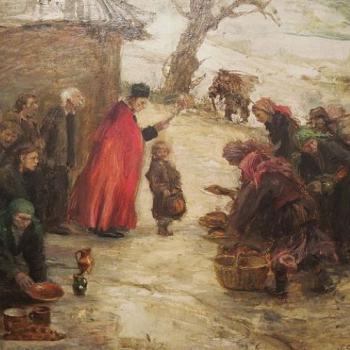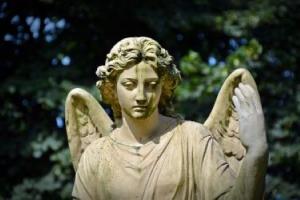 Catholics are already arguing about a new movie set to hit theaters in March. Cabrini, produced by Angel Studios, which also gave us the television series The Chosen, tells the story of St. Frances Xavier Cabrini, the first American saint. Mother Cabrini, who immigrated to the U.S. from Italy in 1889, spent her life building hospitals and orphanages, teaching children their catechism, and assisting her fellow immigrants in a largely Protestant country that was hostile to Catholics. She became a naturalized American citizen in 1909, died in 1917, and was canonized in 1946.
Catholics are already arguing about a new movie set to hit theaters in March. Cabrini, produced by Angel Studios, which also gave us the television series The Chosen, tells the story of St. Frances Xavier Cabrini, the first American saint. Mother Cabrini, who immigrated to the U.S. from Italy in 1889, spent her life building hospitals and orphanages, teaching children their catechism, and assisting her fellow immigrants in a largely Protestant country that was hostile to Catholics. She became a naturalized American citizen in 1909, died in 1917, and was canonized in 1946.
While widely loved, Mother Cabrini wasn’t universally beloved. Clips from the upcoming movie show the battles she fought during her lifetime against anti-Italian bigotry and against contempt for the poor. Some Catholics are annoyed that the film focuses more on Mother Cabrini’s battles for social justice than it does on her religious piety. As one conservative Catholic influencer exclaimed on social media:
“This is not a religious film, and all the Catholic saint stuff is fine and all, but it’s incidental to the universal, humanitarian story…. Whew! We wouldn’t want God or prayer or Christ or [Mother Cabrini’s] status as a faithful Catholic sister to get in the way of a great secular movie!”
Of course, many saints faced conflict during their lifetimes. St. Thomas Becket struggled with Henry II to maintain the Church’s independence in England. Four hundred years later, St. Thomas More went to the scaffold rather than acknowledge Henry VIII as head of the Church. Even in our day, Mother Teresa battled the powers that be in countries in which her sisters struggled to establish homes for the dying. And some saints still draw more than their fair share of conflict from non-Catholics who object to the premises of their canonization. When Junipero Serra was canonized in 2015, many activists protested on the basis of St. Junipero’s treatment of Native Americans.
But Mother Cabrini may have the distinction that her canonization riled up Catholics who knew her personally and interacted with her directly during her lifetime.
When Mother Cabrini was canonized, this elderly Catholic woman was not pleased, to say the least. Catholic Answers’ chaplain told us that, when she heard the news, this Catholic ranted to her Dominican nephew, “I will never pray to that woman! I HATED THAT WOMAN!”
Why did this woman hate Mother Cabrini? Who knows. But I loved the story. To me, it showed the human frailty of saints. Even a woman who was not beloved by at least some of the children she served somehow managed to make it to heaven. That actually gives me hope for myself.
“Now, wait just a God-blessed minute, Michelle!” you may be saying. “Why are you taking it for granted that this Catholic woman was correct in her assessment of Mother Cabrini? Doesn’t her very admission that she hated Mother Cabrini demonstrate she’s an unreliable narrator of someone the Church officially canonized?”
Short answer? No.
To be clear, hatred isn’t a virtue. Nursing hatreds can, in fact, eat away at a soul like acid. But that doesn’t mean that the person who hates is wrong in their assessment of someone they knew and with whom they directly interacted. The very fact that the elderly Catholic woman personally knew Mother Cabrini during the saint’s lifetime actually bolsters her credibility. She is exactly the kind of witness Church officials would’ve wanted to interview during the investigation into Mother Cabrini’s life.
That doesn’t necessarily mean that Mother Cabrini’s canonization would have been torpedoed if only this woman had been called upon to testify. The investigators could have found the witness’s testimony entirely credible and valid, and still have recommended Mother Cabrini for canonization. Why?
Because, as I’ve said over and over, while nobody seems to listen: holiness is not synonymous with perfection. Holiness means to live one’s life for God. It doesn’t mean that the holy person doesn’t ever make mistakes (including serious mistakes) or commit sins (including mortal sins). What matters to those investigating a Catholic’s life is that the candidate for sainthood shows desire for union with God and the practice of virtue to a heroic degree. Saints need not be holy their entire lives, and in fact many of them weren’t, even up to the very end of their lives. A priest familiar with the process once told me he was told to focus the bulk of his attention on a candidate’s final fifteen years.
Jesus exhorted Christians to “be perfect … as your heavenly Father is perfect” (Matt. 5:48). He also told us how to become perfect: “If you wish to be perfect, go, sell your possessions, and give the money to the poor, and you will have treasure in heaven; then come, follow me” (Matt. 19:21).
By this test, Mother Cabrini certainly showed her desire for perfection. She chose to enter religious life, taking a vow of poverty. As a child, she dreamed of becoming a missionary, although in her dreams she envisioned herself sailing off to the Far East. When the pope told her to go west instead, to head to the United States to support poverty-stricken Italian immigrants, she went obediently. In the United States, she criss-crossed the country, establishing supports not just for Italian immigrants but for all in need, even detouring into Central and South America. Eventually, after her death, her sisters finally made it to China. She has been named the patron saint of immigrants.
Becoming perfect though is a lifelong process. It begins with desire (Aquinas advised Christians to “will it”); progresses through trials and hardships, including much suffering; encompasses many imperfections that require repeated repentance and amendment of life; and ends in eternal friendship with God. If saintly persons aren’t entirely perfect at death, they may end up burning off the remnants of their human frailties in purgatory—which is the place where all who are saved finally can be made perfect.
The author of the letter to the Hebrews famously said that Jesus sympathizes with our weaknesses because he is like us in all things but sin (Heb. 4:15). The implication there is that Jesus experienced weaknesses (such as hunger, tiredness, and even quailing in the face of his passion that brought an angel to his side to strengthen him). As God though, he was incapable of sin.
Which is where the saints can help even where God himself cannot. The saints are like us in all things including sin. They know what it is like to fall from grace, to suffer for having sinned, and to find one’s way back to God by his grace. They offer hope that, no matter how far we’ve fallen, it’s always possible to rise again. And again. For the rest of our lives.
Those who would deny the saints’ human frailties, their imperfections, and, yes, even their sins, deny Christians one of the supports in the spiritual life that God gives us.
(Image: Theatrical poster for the film, Cabrini, Lodigiano Film Development Inc., 2024. Used under fair use guidelines.)












